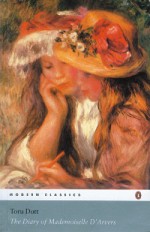Book Review
Love and Death in Provincial France
Kaiser Haq
The Diary of Mademoiselle D'Arvers by Toru Dutt, translated from the French by N. Kamala, with an introduction by G. J. V. Prasad. Delhi: Penguin Books, 2005. Rs. 200. The extraordinary precocious literary talent of Toru Dutt (1856-77) was all the more remarkable in being bilingual in two foreign languages--English and French. Following her death her father discovered a complete novel in French among her papers. This was La Journal de Mademoiselle D'Arvers, which was published in 1879 by the Paris house of Didier, with an admiring introduction by the French writer Clarisse Bader. Though it was warmly received,the book has long been a rarity, known about but not seen. Years back, like the translator N. Kamala, I obtained a photocopy (with the help of Farouk Amin of our Foreign Service) from the Bibliothèque Nationale in Paris, hoping to interest someone with the necessary linguistic equipment in translating it. A then-pupil of mine, Arifa Hafiz, having studied French in school and at university, did produce an eminently readable translation, but not finding a ready taker for the manuscript, decided to forget about it. With Kamala's translation out, it is unlikely that Arifa's will ever see the light of cold print. That is a pity, for Arifa's seems to be the more felicitous version. I have a copy of the first half of it and have made some quick comparisons. Not that Kamala's translation doesn't read well; it does, but even on a quick run-through I was pulled up short at a few points. She consistently mistranslates "le salon" as "hall"; Arifa renders it accurately as "drawing room." In the third paragraph Kamala translates the phrase "et nous quittames ensemble ce paisible sejour" as "and together we left this peaceful sojourn." Now, the French, "sejour" means both "sojourn" and "abode" or place of sojourn"; but the use of "sojourn" in English to mean the latter, though common in Middle English, does not conform to modern usage. Arifa, sensibly, has "and together we left that peaceful abode." In Kamala's translation of the opening sentence of the entry for 20 August 1860 we find the unidiomatic phrase "last evening" and ends the paragraph with the equally unidiomatic "took my hand with kindness," rendering literally the French "avec bienvaillance." Arifa of course has "yesterday evening" and rounds off the paragraph with "held my hand very kindly." One final example. In the Epilogue we stumble on the phrase "his heart was wrenching" where the participle is an unidiomatic rendering of the French "se brisait," which simply means "breaking." Turning to other matters, let me point out that the original text has an epigraph in English, which has been omitted. In the Translator's Note a paragraph is unnecessarily devoted to justifying the retention of French honorifics, as in the title, and the French forms of characters' names. Has anyone seen an English translation of Flaubert's masterpiece under the title Mrs Bovary and with a character called Leo (that's the cad Léon of course)? Another paragraph explains that the Psalm quoted in the text has been represented by the King James' version of it "instead of a more modern one in order to give a sense of an earlier time frame with its use of thee and thou which no longer figure in contemporary translations." But is that all that is relevant? Since the King James version is a Protestant text, wouldn't a stickler for authenticity prefer the Douai Bible, which is the classic Catholic version of the scriptures in English. Despite playing the carping critic, I have no hesitation in recommending the translation to the common reader. The story, with all its Victorian sentimentality and post-Romantic passion, does come across fairly smoothly. The eponymous heroine, 15-year-old Mademoiselle Marguerite d'Arvers, comes home after finishing her convent schooling, and discovers love when she comes across the young Count Dunois. He, however, has a dark, Byronic side and in a fit of lunacy murders his brother Gaston over an attractive village belle. Dunois, condemned to penal servitude, takes his own life. Marguerite falls ill and on recovering decides out of a sense of duty to her parents to accept the proposal of her devoted admirer, Captain Louis Lefèvre, whom she had earlier turned down. In time she grows to love Louis but her happiness is soon terminated. She dies, leaving behind a little son. Such are the bare bones of the story. The language is prissy and sentimental, but that is very much in character, considering Marguerite's bourgeois background. Readers who quietly swallow the often mawkish idiom will be rewarded with a tantalizing view of the hidden and often horrifying depths of our passional life . This is probably the first Indian novel, in any language, to take on these fascinating post-Romantic themes--enough to make it a must for anyone interested in our cultural history. Kaiser Huq teaches English at Dhaka University.
|

The Diary of Mademoiselle D'Arvers by Toru Dutt, translated from the French by N. Kamala, with an introduction by G. J. V. Prasad. Delhi: Penguin Books, 2005. Rs. 200. |